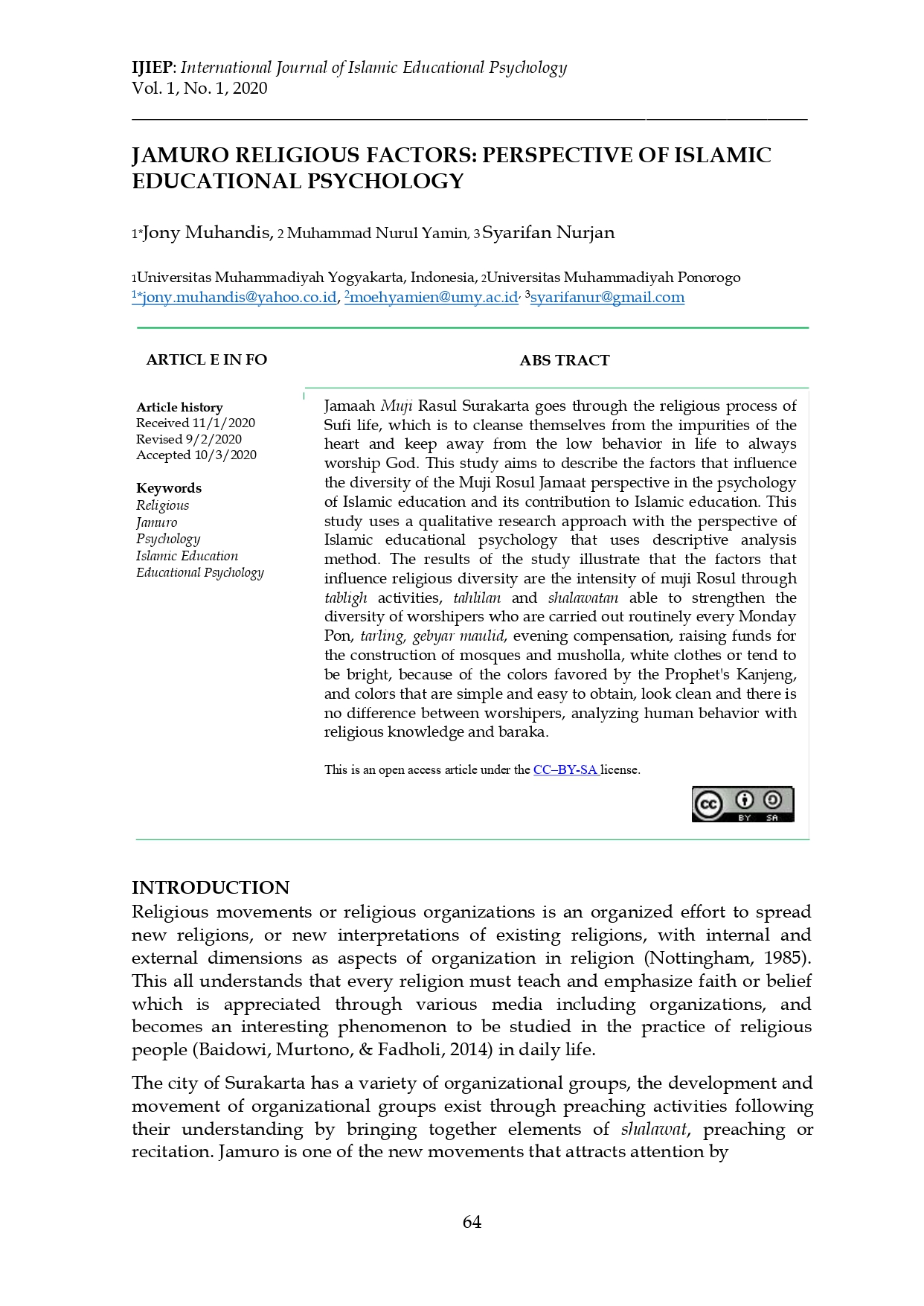Jamuro Religious Factors: Perspective of Islamic Education Psychology
DOI:
https://doi.org/10.18196/ijiep.1106Keywords:
Religion, Jamuro, Psychology, Islamic Education, Educational Psychology.Abstract
Jamaah Muji Rasul Surakarta goes through the religious process of Sufi life, which is to cleanse yourself from the impurities of the heart and keep away from the low behavior in life with the intention to always worship God. This study aims to describe the factors that influence the diversity of the Muji Rosul Jamaat perspective in the psychology of Islamic education and its contribution to Islamic education. This study uses a qualitative research approach with the perspective of Islamic educational psychology that uses descriptive analysis method. The results of the study illustrate that the factors that influence religious diversity are the intensity of muji Rosul through tabligh activities, tahlilan and shalawatan able to strengthen the diversity of worshipers who are carried out routinely every Monday Pon, tarling, gebyar maulid, evening compensation, raising funds for the construction of mosques and musholla, white clothes or tend to be bright, because of the colors favored by the Prophet's Kanjeng, and colors that are simple and easy to obtain, look clean and there is no difference between worshipers, analyzing human behavior with religious knowledge and baraka.
References
Baidowi, A. A., Murtono, & Fadholi, M. Y. (2014). Suhuf. Journal of Psychology, 26(2).
Chaer, M. T. (2017). Islam dan Pendidikan Cinta Damai. Istawa: Jurnal Pendidikan Islam, 2(1), 73-94.
Creswell, J. W. (1994). Research Design Qualitative and Quantitative Approaches. London: Sage Publications.
Moelong, L. J. (2014). Qualitative Research Methods, Revised Edition. Bandung: PT. Youth Rosdakarya.
Muhaimin. (2002). Paradigm of Islamic Education (Efforts to Effective PAI in Schools). Bandung: Youth Rosdakarya.
Nottingham, E. K. (1985 ). Religion and Society. Jakarta: CV. Rajawali.
Primasari, A., & Yuniarti, K. W. (2012). What make teenagers happy? An exploratory study using indigenous psychology approach International Journal of Research Studies in Psychology, 1(2), 53-61
Setiawan, W. (2015). Prosesi Baiat Jamaah Tarekat Sattariyyah; Sebuah Kajian Fenomenologi. AL-MURABBI: Jurnal Studi Kependidikan dan Keislaman, 1(2), 63-76.
Setiawan, W. (2016). Fanatisme Dalam Berorganisasi. Muaddib: Studi Kependidikan dan Keislaman, 4(1), 20-44.
Setiawan, W., Tajab, M., & Chaer, M. T. (2019). Ruh, Soul, Heart, Mind, and Body in the Perspective of Islamic Educational Psychology. Paper presented at the WESTECH.
Suud, F. M. (2018). Pendidikan Kedamaian di Era Digital (Telaah Model Forgiveness dalam Psikologi Islam). FIKROTUNA: Jurnal Pendidikan dan Manajemen Islam, 7(1), 694-716. doi:10.32806/jf.v7i1.3170
Suud, F. M., & Madjid, A. (2020). Honesty: A Multidimensional Study as Motivation for National Character Building. Hayula: Indonesian Journal of Multidisciplinary Islamic Studies, 4(1), 99-116. doi:10.21009/hayula.004.1.06
Syarifan Nurjan, & Muhandis, J. (2019). Jamuro and Islamic Education (Indegenous Psychology Perspective). In: ICEPP: Diversity in Education, School of Postgraduate Studies, Indonesian University of Education.

Downloads
Published
How to Cite
Issue
Section
License

- Share — copy and redistribute the material in any medium or format
- Adapt—remix, transform, and build upon the material for any purpose, even commercially.
The licensor cannot revoke these freedoms as long as you follow the license terms. Under the following terms:
- Attribution: You must give appropriate credit, provide a link to the license, and indicate if changes were made. You may do so in any reasonable manner, but not in any way that suggests the licensor endorses you or your use.
- ShareAlike: If you remix, transform, or build upon the material, you must distribute your contributions under the same license as the original.
- No additional restrictions — You may not apply legal terms or technological measures that legally restrict others from doing anything the license permits.






